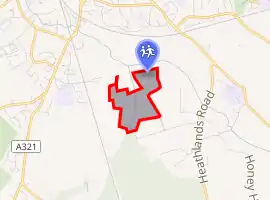Ludgrove School
Ludgrove School is an independent preparatory boarding school for 200 boys, aged eight years to thirteen. It is situated in the civil parish of Wokingham Without, adjoining the town of Wokingham in the English county of Berkshire. Aside from certain cathedral schools, it is one of the few remaining single-sex full boarding preparatory schools in the country.
| Ludgrove | |
|---|---|
 | |
| Address | |

| |
Ludgrove , , RG40 3AB | |
| Coordinates | 51.400°N 0.826°W |
| Information | |
| Type | Independent preparatory boarding school |
| Motto | Whatever Thy Hand findeth to do, do it with all thy might.(Ecclesiastes 9:10 ) |
| Religious affiliation(s) | Church Of England |
| Established | 1892 |
| Founder | Arthur Dunn |
| Chairman of the Governors | Philip Edey QC |
| Headmaster | Simon Barber |
| Staff | 50 |
| Gender | Boys |
| Age | 8 to 13 |
| Enrolment | 200 |
| Houses | Jellicoe, Kitchener, Haig, Drake, Wellington, Nelson |
| Colour(s) | Blue and white |
| Former pupils | Old Ludgrovians |
| Website | http://www.ludgrove.net/ |
Founded at Ludgrove Hall, Cockfosters, in 1892, in 1937 the school moved to its present site at Wokingham, previously occupied by the former Wixenford School, which had closed in 1934.
History


The school was founded in 1892 by Arthur Dunn in north London. Dunn, a footballer, recruited a number of sportsmen to assist him as masters and was succeeded, on his premature death, by two England international football captains, G.O. Smith and William Oakley, who became joint headmasters.
Ex-pupil Alistair Horne wrote an unflattering account of his time at the school in the 1930s in which he described "humbug, snobbery and rampant, unchecked bullying" which he thought was intended to toughen the boys up.[1]
In 1937 the school was moved from Cockfosters to its present location at Wixenford, Wokingham, taking over the buildings of the former Wixenford School.[2] Alan Barber, a well known cricketer, was headmaster for many years. The school business was turned into a charitable trust in 1972, and Barber's son Gerald—together with Nichol Marston—became joint headmasters. In July 2004, Marston retired. In 2008, Ludgrove's headmasters were Sid Inglis and Gerald Barber's son Simon. In July 2013, Inglis left the school to take up a headship at Elstree School.
In 2004, Ludgrove was the victim of an arson attack which caused over £100,000 in damage to the school's cricket pavilion.
The school today
The school buildings include a private chapel, two science laboratories, a music school, specialist art, carpentry, pottery, information technology departments,a gymnasium and theatre. Its extensive sporting facilities include a 9-hole golf course, a swimming pool, two fives courts, two squash courts, four tennis courts, and around eleven pitches for ball games, all set in 150 acres (0.61 km2) of school land.
The fees are £9,420 per term.[3]
Notable Old Ludgrovians
- Prince Alexander of Yugoslavia.[4]
- Prince William, Duke of Cambridge (elder son of The Prince of Wales and Diana, Princess of Wales)[5]
- Prince Harry, Duke of Sussex (younger son of The Prince of Wales and Diana, Princess of Wales)[6]
- Peter Ainsworth, MP East Surrey[7][8]
- Rear Admiral Sir Nigel Cecil
- Charles Cumming
- Wykeham Cornwallis, 2nd Baron Cornwallis[9]
- Alec Douglas-Home, Prime Minister of the United Kingdom, 1963 to 1964
- John Spencer Dunville VC
- James Carnegie, 3rd Duke of Fife
- Prince Edward, Duke of Kent
- Paul Foot, journalist [10]
- Bear Grylls, mountaineer, writer, presenter and Chief Scout
- Colin Ingleby-Mackenzie
- George Lascelles, 7th Earl of Harewood
- General Sir Oliver Leese
- Sir Shane Leslie
- Robert R. McCormick
- Sir Osbert Sitwell, 5th Baronet
- Edward Stanley, 19th Earl of Derby (born 1962)
- Alexander Thynn, 7th Marquess of Bath
- Charlie van Straubenzee
- Thomas van Straubenzee
- Thady Windham Thomas Wyndham-Quin, 7th Earl of Dunraven and Mount-Earl
Notable masters
- Alan Barber (1905–1985), Yorkshire cricket captain, headmaster
- Arthur Dunn (1861–1902), founder of the school
- William Oakley (1873–1934), England football captain, joint headmaster
- Cecil Sharp (1859–1924), founding father of the English folk music revival, part-time music master 1893 - 1910
- G. O. Smith (1872–1943), England football captain and centre-forward, joint headmaster
- Robin Milford (1903–1959), composer, part-time music master
References
- Horne, Alistair (2012). A Bundle From Britain. Macmillan. p. 85. ISBN 978-1-4472-3177-6.
- Donald P. Leinster-Mackay. (1984) The Rise of the English Prep School. p. 154.
- Fees. Ludgrove School. Retrieved 03 Dec 2019.
- "Yugo-Slavian Boy Prince", The Citizen (Gloucester), 9 May 1935, p. 8. British Newspaper Archive. Retrieved 11 January 2016. (subscription required)
- "The Duke of Cambridge". biographic sketch. The British Monarchy (UK government). 2011. Retrieved 9 August 2011.
Prince William is the elder son of The Prince of Wales and Diana, Princess of Wales ... From September 1990, The Prince attended Ludgrove School in Berkshire, for five years until 5 July 1995.
- "Prince Harry". biographic sketch. The British Monarchy (UK government). 2011. Retrieved 9 August 2011.
In 1989 Prince Harry joined Prince William at Wetherby School, moving to Ludgrove School in Berkshire in September 1992.
- "The Peter Ainsworth MP in British Socialists Party Directory". biographic sketch. UK Political Parties Directory. Retrieved 10 August 2011.
Peter Michael Ainsworth was born in 1956. He was educated at Ludgrove, Wokingham; Bradfield College, Berkshire, and Lincoln College ...
- "Peter Ainsworth: Electoral History and Profile". The Guardian. Retrieved 10 August 2011.
School: Ludgrove, Wokingham
- Lewis P. (2014) For Kent and Country. Brighton: Reveille Press. pp. 136–141.
- Foot, Paul. (1990) Words as Weapons. Verso. Introduction. ISBN 0-86091-527-1
Further reading
- Barber, Richard. (2004) The Story of Ludgrove. Guidon Publishing. ISBN 0-9543617-2-5
External links
- Ludgrove School website
- Profile on the ISC website